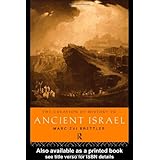
Average Reviews:

(More customer reviews)This book examines the process of the creation of history in the Hebrew Bible. Brettler sets out to "show what various biblical authors were `trying to do' when they wrote" their respective works.
The author begins with a strong survey of the history of historical criticism, followed by a presentation of what he believes to be the "four central factors responsible for the production of ancient Israelite biblical texts:" the use of typologies, the interpretation of earlier texts, literary shaping, and ideological influence. During an introductory discussion of `history,' `ideology,' and `literature,' Brettler suggests that what has classically been understood as `history' should actually be called `historiography' or `history writing,' while history should be understood simply as, "a narrative that presents a past." Along the same lines, `ideology' is best considered "a specific set of beliefs," which Brettler differentiates from `propaganda,' which is the method used to disseminate those beliefs. Finally, the author discards the word `literature' as an accurate description of the biblical text, arguing that "literary works are determined by the community, not by their authors." Therefore since the author did not consider his work to be literature, but rather a history, we too should refrain from calling the narrative `literature.' Brettler does concede that there are various rhetorical or literary devices and genres employed within the biblical text, but since the author employed these devices with the intention of writing a narrative history, we too should refrain from referring to the results of his literary endeavors as `literature.' This is a fine hair to split and will certainly be criticized by future respondents.
Brettler then presents his evidence in a series of six chapters that increase in degree of redaction-critical difficulty. This section is cleverly bracketed by a discussion of Chronicles (chapter 2) on the front end, in which we have the extant sources (Samuel and Kings) used by the Chronicler in his redaction, and concluding with "Text in a Tel" (chapter six), a detailed discussion of redaction-criticism that uses the multi-layered redactions of 2 Kings 17 as the literary ground in need of excavation.
Brettler's indebtedness to his teacher, Michael Fishbane, is evident the moment Brettler begins his intrabiblical exegesis of the text (chapters 2-7). This is a strength of the book, in that the author highlights many textual examples essential to any survey of redaction-criticism methodology, and in seeking an explanation of each highlighted redaction, the author tells the story of the creation of the history of Israel.
Brettler's best work is with his treatment of Chronicles. He states, "The Chronicler...provides an incontrovertible example of the flexibility of the past in the hands of one biblical historian." But Brettler ultimately leaves open for debate the question of whether the Chronicler felt he was correcting earlier scribal errors or whether he was the historian "of a totalitarian regime, attempting to control the ideology of the population." This is an important question to say the least, for its answer determines whether the Hebrew Bible was composed as multiple redactions of early oral and written themes and histories, or was composed late in history solely from the ideological imagination of the Deuteronomistic Historians.
The author then proceeds with his analysis, suggesting that the repeated promotion of Judah over the firstborn Reuben in the Genesis narrative illustrates the biblical author's use of typologies within the text. In Deuteronomy, Brettler offers a classic treatment in which he substantially demonstrates a revision of history on the behalf of the Deuteronomist. The author's treatment of the Ehud-Eglon story as satire was a surprisingly compelling argument. Here, Brettler suggests that the purpose of this genre is to increase the life span of the story's moral by using mocking, sexual, and scatological references towards Israel's Moabite enemies. Finally, Brettler discusses ideology, using the book of Samuel as a vehicle that promotes David and offers an apology for the royal ideology of the Davidic line.
Brettler ends his book with a healthy discussion of whether it is possible to reconstruct actual history. Following R. G. Collingwood, Brettler offers an analogy to the American legal system which discusses the two tests that are used in determining the validity of an argument: the unanimity rule of criminal courts that requires something be "beyond a reasonable doubt," and the less stringent majority rule of a civil court that only requires a "preponderance of evidence." Holding up Lionel Grossman's view as a model, Brettler concludes that "history cannot be objective in the sense of `ontologically founded,' but can be `something like rationally justifiable or defensible, not arbitrary, and open to criticism.'" Inasmuch, one can never be certain that one has recreated the actual past, because the past, especially a narrative one, is never fully recoverable. The responsible scholar should accept this reality and "decide which of the alternative reconstructions of the Israelite past best fits the evidence." Brettler concludes, "Biblical historical texts reflect a combination of genuine interest in the past, strong ideological beliefs and refined rhetorical devices."
With the exception of the persistent denotation of possessive plurals with a double apostrophe (or is it a quotation mark?), a practice never before encountered by the present reviewer, Brettler's work is well written, well argued, and is a great addition to the library of the biblical scholar or historian interested in the narrative history of Israel.
Click Here to see more reviews about: The Creation of History in Ancient Israel
The Creation of History in Ancient Israel demonstrates how the historian can start to piece together the history of ancient Israel using the Hebrew Bible as a source.
Click here for more information about The Creation of History in Ancient Israel

0 comments:
Post a Comment